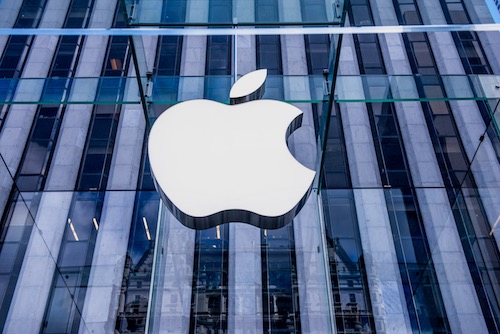“The FRAND determination is at the lower end of what was expected in this high-profile litigation, and certainly below what Optis was likely to be seeking.”
 A UK judge in May determined in a non-public judgment that has been widely reported on that Apple should pay Optis a total of $56.43 million plus interest for a worldwide FRAND license to Optis’s portfolio of 4G standard essential patents (SEPs). In the most recent development in the overall case, Apple yesterday reportedly lost its appeal in one of the four technical trials pending between the parties, meaning it could still be liable for fees related to infringement in the range of $7 billion.
A UK judge in May determined in a non-public judgment that has been widely reported on that Apple should pay Optis a total of $56.43 million plus interest for a worldwide FRAND license to Optis’s portfolio of 4G standard essential patents (SEPs). In the most recent development in the overall case, Apple yesterday reportedly lost its appeal in one of the four technical trials pending between the parties, meaning it could still be liable for fees related to infringement in the range of $7 billion.
Mr Justice Marcus Smith, a High Court Judge who is President of the Competition Appeals Tribunal, made the determination in a 500-paragraph judgment announced on June 7, 2023. [2023] EWHC 1095 (Ch). While the judgment was handed down on June 7, it is dated May 10, which is the date the full, unredacted judgment was shared with the “confidentiality ring”.
The ruling followed various trials and appeals on the validity and essentiality of certain Optis patents. However, the judgment has not been formally published yet and both parties have requested extensive redactions regarding confidential information, mainly relating to license agreements with third parties.
The judge found that Apple needed a license not to the totality of the Optis SEP portfolio, which would be a share of 0.61% of the total patent stack (135 out of 22,000 patent families), but to a smaller portfolio, which amounted to a stack share of 0.38%. This translated to an annual royalty of $5.13 million. He said he wanted to achieve “patent peace” and the license should cover any and all future Apple products that might infringe (including a hypothetical Apple car).
The license should run until the last relevant Optis patents expire and Apple should pay for five years up front (i.e. $25.65 million) as well as for the six years since Optis first asserted its patents in 2017 (i.e. $30.78 million plus compound interest at 5%). As the license closes out any claims against Apple, any proceedings anywhere in the world by Optis against Apple in respect of the portfolio should cease as part of the license agreement.
This is the second FRAND determination by the England & Wales High Court since the landmark Unwired Planet ruling, following the judgment of Mr Justice Mellor in InterDigital v Lenovo.
How FRAND Was Determined
The FRAND determination is at the lower end of what was expected in this high-profile litigation, and certainly below what Optis was likely to be seeking (although full details are not available in the redacted judgment).
While the judge criticized the arguments of both parties, he preferred Apple’s evidence on certain key points. Notably, he preferred to take a lump sum rather than an ad valorem approach to the price of the total stack of patents.
Both parties presented what they claimed were comparable licenses with third parties in support of their positions. But the judge said these could not be deployed to value the portfolio without significant work (referred to as “unpacking”).
He found that the Optis comparables were “worse than useless at deriving a rate for Apple to pay” and that the process of “unpacking” comparables where the payment mechanism was lump sum rendered them unreliable. He also said the Optis comparables were “in ad valorem terms, grossly excessive” and therefore he discounted them.
However, once properly analyzed, the 19 Apple comparables were useful for making a lump sum assessment of the annual royalty due for the entire stack. These comparables also had the advantage that they represented a negotiated outcome between Apple and various SEP owners and it meant the price of the stack would be tailored to the person wishing to purchase it.
The judge stressed that it is the monetary amount payable that needs to be FRAND. The judgment said: “How that monetary amount is calculated to reach a FRAND rate depends on all the circumstances – whether the rate should be ad valorem, per unit or lump sum. The same components – importance of the product, volumes sold, price – inform what it is fair to pay. But dogmatically to suggest that one rate fits all is simply wrong.”
No Hold Out or Hold Up
Optis accused Apple of Hold Out by acting in bad faith, while Apple accused Optis of Hold Up by abusing a dominant position. The judge commented that as FRAND license terms have to be negotiated, “a certain degree of Hold Up and Hold Out is to be expected as inevitable” and that, though they may be undesirable, neither is intrinsically unlawful.
His short answer to both accusations was therefore that they were entirely irrelevant and were a waste of time and money. A longer answer, in response to the parties’ contentions, was that there was no abuse by Optis because Apple was not excluded from a market or inhibited in its commercial activities, and in any case, Optis was not a dominant undertaking, and Optis’s contentions regarding Hold Out by Apple were both unfounded and legally irrelevant to anything other than the FRAND license terms.
A more readable version of the judgment with fewer redactions is expected to be published soon, after issues regarding confidentiality have been dealt with. Rulings on costs and permission to appeal are also expected.

![[IPWatchdog Logo]](https://ipwatchdog.com/wp-content/themes/IPWatchdog%20-%202023/assets/images/temp/logo-small@2x.png)

![[Advertisement]](https://ipwatchdog.com/wp-content/uploads/2024/04/UnitedLex-May-2-2024-sidebar-700x500-1.jpg)
![[Advertisement]](https://ipwatchdog.com/wp-content/uploads/2024/04/Patent-Litigation-Masters-2024-sidebar-700x500-1.jpg)

![[Advertisement]](https://ipwatchdog.com/wp-content/uploads/2021/12/WEBINAR-336-x-280-px.png)
![[Advertisement]](https://ipwatchdog.com/wp-content/uploads/2021/12/2021-Patent-Practice-on-Demand-recorded-Feb-2021-336-x-280.jpg)
![[Advertisement]](https://ipwatchdog.com/wp-content/uploads/2021/12/Ad-4-The-Invent-Patent-System™.png)






Join the Discussion
No comments yet.